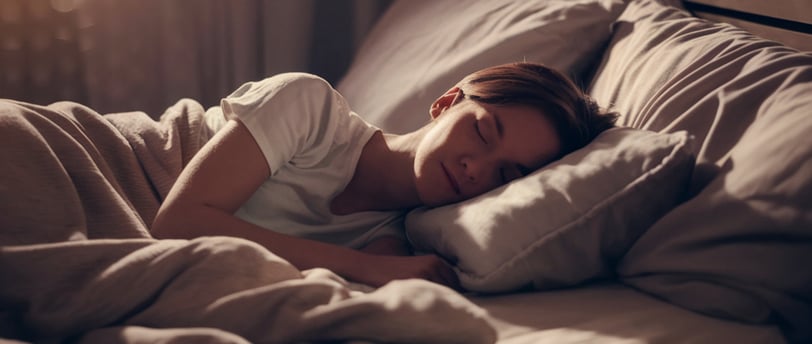

Why is Sleep Important?
Sleep is a biological process that allows for physical and mental recovery. Its quality is linked to numerous health benefits:
Cognitive Improvement: During sleep, the brain processes and organizes information, which improves memory and learning ability (Diekelmann & Born, 2010).
Physical Health: Lack of sleep has been associated with an increased risk of chronic diseases such as type 2 diabetes, cardiovascular diseases, and obesity (Cappuccio et al., 2010).
Mood: Good rest is key to emotional regulation and can reduce the risk of disorders such as depression and anxiety (Walker, 2017).
Importance of Sleep for Training Performance
Muscle Recovery: During sleep, growth hormone is released, which is essential for muscle repair and growth (Horne, 2006).
Performance Improvement: Adequate rest is related to better concentration, coordination, and energy during training (Reilly & Edwards, 2007).
Hormonal Regulation: Lack of sleep can disrupt the production of hormones such as testosterone and cortisol, affecting strength and endurance (Kraemer & Ratamess, 2005).
Injury Prevention: Sleeping enough reduces the risk of injuries (García et al., 2017).
Side Effects of Lack of Rest
Chronic Fatigue: Sleep deprivation can lead to persistent fatigue, affecting both physical and mental performance (Hirshkowitz et al., 2015).
Mental Health Issues: Lack of sleep has been associated with increased anxiety and depression (Walker, 2017).
Decreased Immune Function: Inadequate sleep can weaken the immune system, increasing susceptibility to illnesses (Cohen et al., 2009).
Metabolic Alterations: Sleep deprivation can increase appetite and insulin resistance, contributing to weight gain (Spiegel et al., 2004).
Low Athletic Performance: Chronic sleep deprivation can result in reduced athletic performance, affecting strength, endurance, and recovery (Reilly & Edwards, 2007).
Supplements to Improve Sleep Quality
Melatonin: This hormone regulates the sleep cycle and can be useful for falling asleep, especially in cases of jet lag or shift work (Brzezinski et al., 2005).
Magnesium: This mineral can help reduce stress and improve sleep quality by promoting relaxation (Wienecke et al., 2016).
L-Theanine: An amino acid present in green tea, it has been shown to promote relaxation and improve sleep quality (Lyon et al., 2011).
Valerian: This plant has traditionally been used to treat insomnia and may be effective in improving sleep quality (Giaccone et al., 2018).
GABA (Gamma-Aminobutyric Acid): A neurotransmitter that can help reduce neuronal activity and promote relaxation, making it easier to sleep (Hale et al., 2018).
It is recommended to consult a healthcare professional before starting any supplement to determine the appropriate dosage and avoid interactions with other medications.
Strategies to Improve Sleep Quality
Establish a Routine: Keeping regular sleep schedules helps regulate the sleep cycle.
Create an Optimal Environment: A dark, quiet bedroom at a comfortable temperature improves sleep quality.
Limit Exposure to Screens: The blue light from electronic devices interferes with melatonin production; it is recommended to avoid screens at least one hour before bed (Hale & Guan, 2015).
Practice Relaxation Techniques: Activities such as meditation and yoga can reduce stress and facilitate better rest (Riemann & Nissen, 2013).
Regular Exercise: Regular physical activity promotes better sleep, although intense exercise right before bed should be avoided (Kredlow et al., 2015).
Conclusion
Sleep quality and rest are fundamental to overall health and physical performance. Implementing good sleep hygiene habits and considering proper supplementation can significantly improve quality of life and training performance.
References
Brzezinski, A., et al. (2005). "Melatonin in humans." New England Journal of Medicine.
Cappuccio, F. P., et al. (2010). "Sleep duration predicts cardiovascular outcomes: a systematic review and meta-analysis of prospective studies." Sleep.
Cohen, S., et al. (2009). "Sleep habits and susceptibility to the common cold." Archives of Internal Medicine.
Diekelmann, S., & Born, J. (2010). "The memory function of sleep." Nature Reviews Neuroscience.
García, A. J., et al. (2017). "Sleep and injury risk in athletes: a systematic review." Sports Medicine.
Giaccone, M., et al. (2018). "Valerian root extract for the treatment of insomnia: a systematic review." Journal of Ethnopharmacology.
Hale, L., & Guan, L. (2015). "Screen time and sleep among school-aged children and adolescents: a systematic literature review." Sleep Medicine Reviews.
Hale, A., et al. (2018). "Effects of GABA supplementation on sleep quality." Nutrients.
Hirshkowitz, M., et al. (2015). "National Sleep Foundation's sleep time duration recommendations: methodology and results summary." Sleep Health.
Kraemer, W. J., & Ratamess, N. A. (2005). "Hormonal responses and adaptations to resistance exercise and training." Sports Medicine.
Kredlow, M. A., et al. (2015). "The effects of physical activity on sleep: a meta-analytic review." Sleep Medicine Reviews.
Lyon, M. R., et al. (2011). "L-theanine and its effects on sleep quality." American Journal of Health Promotion.
Riemann, D., & Nissen, C. (2013). "Sleep, insomnia, and psychiatric disorders: a review of the literature." Dialogues in Clinical Neuroscience.
Reilly, T., & Edwards, B. (2007). "Altered sleep/wake cycles and performance in athletes." Sports Medicine.
Spiegel, K., et al. (2004). "Sleep loss and metabolic dysfunction." PLOS Medicine.
Walker, A. M. (2017). "Why We Sleep: Unlocking the Power of Sleep and Dreams." Scribner.
Wienecke, T., et al. (2016). "Magnesium and sleep: A review." Nutrients.

